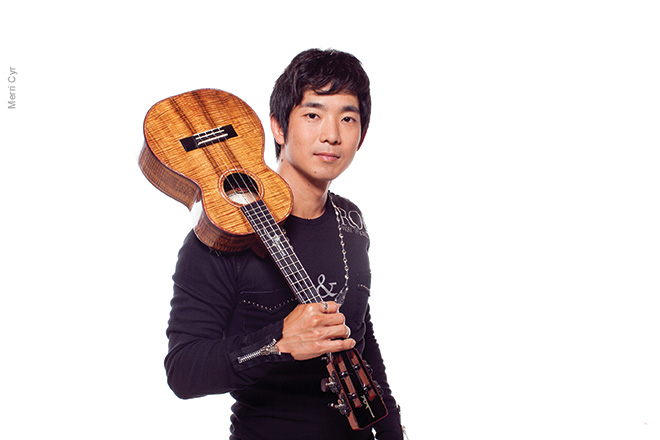JAKE SHIMABUKURO
In his talented hands, the ukulele demands new respect
They say there’s no such thing as an overnight sensation—then there’s ukulele virtuoso Jake Shimabukuro. Though well-known in Japan and in his native Hawaii, he was virtually unknown in the rest of the world until a 2006 YouTube clip of him playing George Harrison’s “While My Guitar Gently Weeps” generated nearly 13 million views and turned him into an international star.
“It singlehandedly changed my life,” says Shimabukuro, 37. “It started a career that’s taken me all over the world. Even today, people come up to me and tell me they saw that YouTube clip. It’s still introducing what I do to people. I feel very lucky I was in the right place at the right time.”
Luck played only a small part—many have compared his musical mastery to Jimi Hendrix and Miles Davis. His original songs, and ingenious covers of tunes like Queen’s “Bohemian Rhapsody,” combine elements of jazz, blues, funk, rock, bluegrass, classical, folk and flamenco. And his concerts have garnered praise from audiences, critics and even the Queen of England after a Royal Variety Performance.
Shimabukuro’s latest album, Grand Ukulele—his 10th solo and 10th released in Japan—has upped the ante. Helmed by ace producer Alan Parsons—the man behind the boards for Abbey Road and The Dark Side of the Moon—and released on Shimabukuro’s own Hitchhike Records label, the album features a 29-piece orchestra and all-star session players.
“It’s the craziest story,” Shimabukuro says. “Alan came to one of my concerts, and I didn’t even know he was there. Weeks later he was on a radio show and mentioned that he’d seen me perform. Then during the interview, they played the clip of ‘While My Guitar Gently Weeps.’ I thought, ‘Wow, that’s the coolest thing ever.’” The two eventually met, and Parsons asked Shimabukuro if he could produce his next album. “What do you say after that?” he says. “I couldn’t stop smiling and I could barely eat. I went in without any expectations, any agenda. I just wanted to see how this genius works, what his process was.
“I wrote most of the songs right there in the studio, and afterward we’d talk about the arrangements. He would say, ‘Yeah, that’s great, but maybe take that middle section and put it toward the end’ or something like that. Or, we’d play through a song and he’d go, ‘I hear some bass and drums on this.’ It was a great experience.”
Shimabukuro plays an instrument too often dismissed as a novelty even though it’s been championed by the likes of Paul McCartney and Pearl Jam’s Eddie Vedder. Shimabukuro—who’s played the ukulele since age 4—isn’t bothered. “I love that people don’t take ukulele seriously,” he says. “Audiences have such low expectations, it adds an element of surprise to a concert. It’s perfect for people who don’t feel they have talent. Many are intimidated by the violin, piano or guitar. But hand them a ukulele and they say, ‘That looks like fun—I can do that.’ I really embrace that part of it, because I’d love to see more people pick it up.”
Embracing musical education is a cause close to Shimabukuro, and the reason he founded the Four Strings Foundation, a nonprofit organization that works with schools to advance music education. “When I was in school, I was always involved in music,” he says. “There was concert band, a Polynesian music class, and a music appreciation class. It broke my heart when I found out all my old schools wiped out their music programs. It was such a great time in my life, and I’d like to give others the opportunity to have that same experience.”
–Lee Zimmerman




comment closed